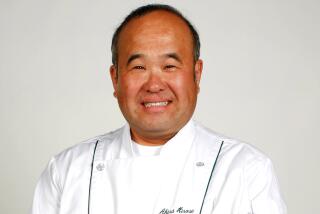Hirohito’s Brother Assailed Japan’s WW II ‘Aggression’ : Asia: Late emperor’s sibling confirms a bold 1944 speech to troops condemning military policy, atrocities in China.
- Share via
TOKYO — In a 1944 speech in Nanking, China, Prince Mikasa--the late Emperor Hirohito’s youngest brother--condemned the Japanese military’s “policy of aggression” toward the Chinese and cruelties such as using prisoners for bayonet practice, a Japanese newspaper reported Wednesday.
In a remarkable interview with the Yomiuri Shimbun, the prince, now 78, detailed the extent of military atrocities against the Chinese and confirmed that he had condemned the aggression in a speech delivered to some Japanese soldiers in China during World War II. Copies of his statements were later quashed and destroyed by military authorities.
A single remaining copy was recently discovered in the library of Parliament by a Kobe University professor.
The prince told the Yomiuri that he wrote and delivered his speech “out of a desperate desire to bring the war to a close” after a one-year assignment as staff officer with Japanese expeditionary forces in the eastern Chinese city of Nanking (now known as Nanjing).
In an assignment that shocked and revolted him, he said he discovered that military officers used Chinese prisoners of war for bayonet practice to instill “guts” in Japanese soldiers; they gassed and shot them en masse after tying them to posts. “It was truly a horrible scene that can only be termed a massacre,” he said.
He also disclosed in his newspaper interview that military officials tried to poison members of the League of Nations’ Lytton Commission, assigned to investigate Japan’s seizure of Manchuria in 1931, by lacing fruit with cholera germs; the investigators did not develop the disease.
The prince, then 27 years old, said he denounced the military near the end of the war for acting against what he believed was the emperor’s strong desire for peace.
But military authorities regarded his remarks as “dangerous” and destroyed copies. Since criticism of the military then was regarded as treason, such outspoken denunciations would have been impossible for anyone but a member of the imperial family, he said.
The Mikasa speech is the first open criticism of the military by an imperial family member and “is of tremendous historical significance as evidence of the imperial family’s basic opposition to the military even in the midst of war,” Yomiuri reported. The military has long sought to legitimize its wartime behavior as done in the name of the emperor.
The remarks are certain to trigger controversy in a nation that remains divided on the nature of its war deeds and responsibility almost half a century after its defeat in World War II.
During their recent travels across the United States, Emperor Akihito and his wife sought to sidestep the issue; the current emperor has expressed “deep sorrow” for the “severe suffering” that the Japanese inflicted upon the Chinese during the war.
Just two months ago, new Justice Minister Shigeto Nagano told a national newspaper that the “Rape of Nanking,” in which the Japanese military raped, robbed and murdered hundreds of thousands of Chinese in 1937, was “a fabrication.” Then-Prime Minister Tsutomu Hata, who emphasized that his government was continuing its predecessor’s view about Japan’s wartime wrongdoing, reprimanded and dismissed Nagano for his remarks, which he retracted.
Conservative Education Ministry officials have long ordered textbook publishers to whitewash such controversial incidents as Japan’s germ warfare experiments in Manchuria and the “Rape of Nanking.”
Even today, those who challenge the right-wing version of history are often threatened or harmed.
After Morihiro Hosokawa denounced the war as a “mistaken war . . . a war of aggression” while prime minister of the newly formed coalition government last year, a rightist tried to assassinate him in May. And when the mayor of Nagasaki suggested after Emperor Hirohito’s death in 1989 that the late emperor bore some guilt for World War II, a right-wing fanatic shot and nearly killed him.
But even as right-wing scholars and sympathizers continue trying to justify Japan’s wartime acts as attempts to escape Western colonization and unite Asia in economic prosperity, the prince sharply attacked that assertion in 1944.
Referring to Japan’s 1940 creation of a puppet government in Nanking, the former Chinese capital, the prince wrote: “It cannot be said that Japan created that government out of a true wish to benefit China or to help the Chinese people form a unified state. Instead, it should be viewed as a kind of makeshift trick prompted by a desire to cover up Japan’s policy of aggression.”
He also said the debate over the Nanking massacre missed the point by focusing on the number of victims (the Chinese say that about 300,000 people were killed; Japanese scholars who acknowledge the massacre occurred say the number of victims was far smaller).
“If you kill prisoners in an atrocious manner, that is a massacre,” he said, adding that there was no doubt Japanese soldiers committed such barbarous acts.
The prince, however, said he never specifically told his brother, Hirohito, about his report. Instead, he shared his China experience with him in “bits and pieces.”
More to Read
Sign up for Essential California
The most important California stories and recommendations in your inbox every morning.
You may occasionally receive promotional content from the Los Angeles Times.














